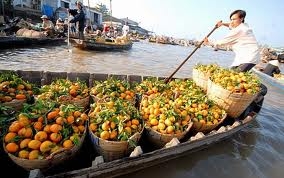Mekong’s river of fortune
 Head of Can Tho University’s Mekong Delta Research Development Institute Nguyen Van Sanh told VIR the delta could not evolve in a sustainable manner during international integration unless the state adopted proper policies to release the region’s immense growth potential.
Head of Can Tho University’s Mekong Delta Research Development Institute Nguyen Van Sanh told VIR the delta could not evolve in a sustainable manner during international integration unless the state adopted proper policies to release the region’s immense growth potential.
Would you shed some light on the region’s huge development potential?
Geographically, the Mekong Delta is home to crucial air routes and shipping lines to international destinations. Besides, the delta is proud of over 700 kilometre coastline with around 360,000 square kilometre special economic zone. It is also contiguous to the East Sea and the gulf of Thailand, very beneficial for development of marine economy and shipping operations.
Stretching over 3.96 million hectares (12 per cent of the country’s total area) and accommodating the country’s 22 per cent population the delta contributes 27 per cent of Vietnam’s gross domestic product (GDP).
Annually, the region churns out over 50 per cent of the country’s total food and more than 90 per cent of total rice export volume, reaping more than $3 billion in export earnings. Seafood production accounts for more than 60 per cent of total output and contributes 80 per cent of the country’s total seafood export volume, gaining over $3 billion from exports.
Notwithstanding, the region is grappling with big challenges associated with poor economic infrastructure and limited human resources.
In fact, the delta’s poverty and backward development is attributed to local farmers’ minuscule production patterns and lack of innovative technologies. Local farmers are highly susceptible to climate change impacts.
Despite being a region abounding with ample growth potential in rice, vegetables, fruits and seafood production its products are generally of low quality and costly, undermining their comparative advantages.
What are the region's planning efforts?
The region is still wasteful in investment allocations for planning activities. Investment projects and programmes are in fact overlapping, inconsistent and not interconnected, entailing low efficiency and losses in social resources. Ineffective planning has led to wastes of resources.
This, in turn, has hampered science and technology development. These challenges made it extremely difficult for the region to evolve in a sustainable manner as the country is deepening its international integration process.
How can the region’s huge potential be unlocked?
Primarily, it is important to foster socio-economic infrastructure development with priority given to the development of transport infrastructure and quality human resources to meet the delta’s development needs.
In addition, the government must adopt specific mechanisms to prop up the delta’s development. The proposal for promoting regional integrity and cooperation between the state, scientists, businesses and farmers was heartily welcomed by provinces and municipalities in the region with the goals of bolstering the production of rice, fruit trees, seafood to help raise farmer incomes through heightening comparative advantages of local crops and livestock.
If the government shortly approved and effectively handled the plan for promoting regional integrity it would help raise people’s subsistence conditions significantly, paving the way for the delta’s further economic upswing.
What the stars mean:
★ Poor ★ ★ Promising ★★★ Good ★★★★ Very good ★★★★★ Exceptional
 Tag:
Tag:
Related Contents
Latest News
More News
- Hermes joins Long Thanh cargo terminal development (February 04, 2026 | 15:59)
- SCG enhances production and distribution in Vietnam (February 04, 2026 | 08:00)
- UNIVACCO strengthens Asia expansion with Vietnam facility (February 03, 2026 | 08:00)
- Cai Mep Ha Port project wins approval with $1.95bn investment (February 02, 2026 | 16:17)
- Repositioning Vietnam in Asia’s manufacturing race (February 02, 2026 | 16:00)
- Manufacturing growth remains solid in early 2026 (February 02, 2026 | 15:28)
- Navigating venture capital trends across the continent (February 02, 2026 | 14:00)
- Motivations to achieve high growth (February 02, 2026 | 11:00)
- Capacity and regulations among British areas of expertise in IFCs (February 02, 2026 | 09:09)
- Transition underway in German investment across Vietnam (February 02, 2026 | 08:00)






















 Mobile Version
Mobile Version